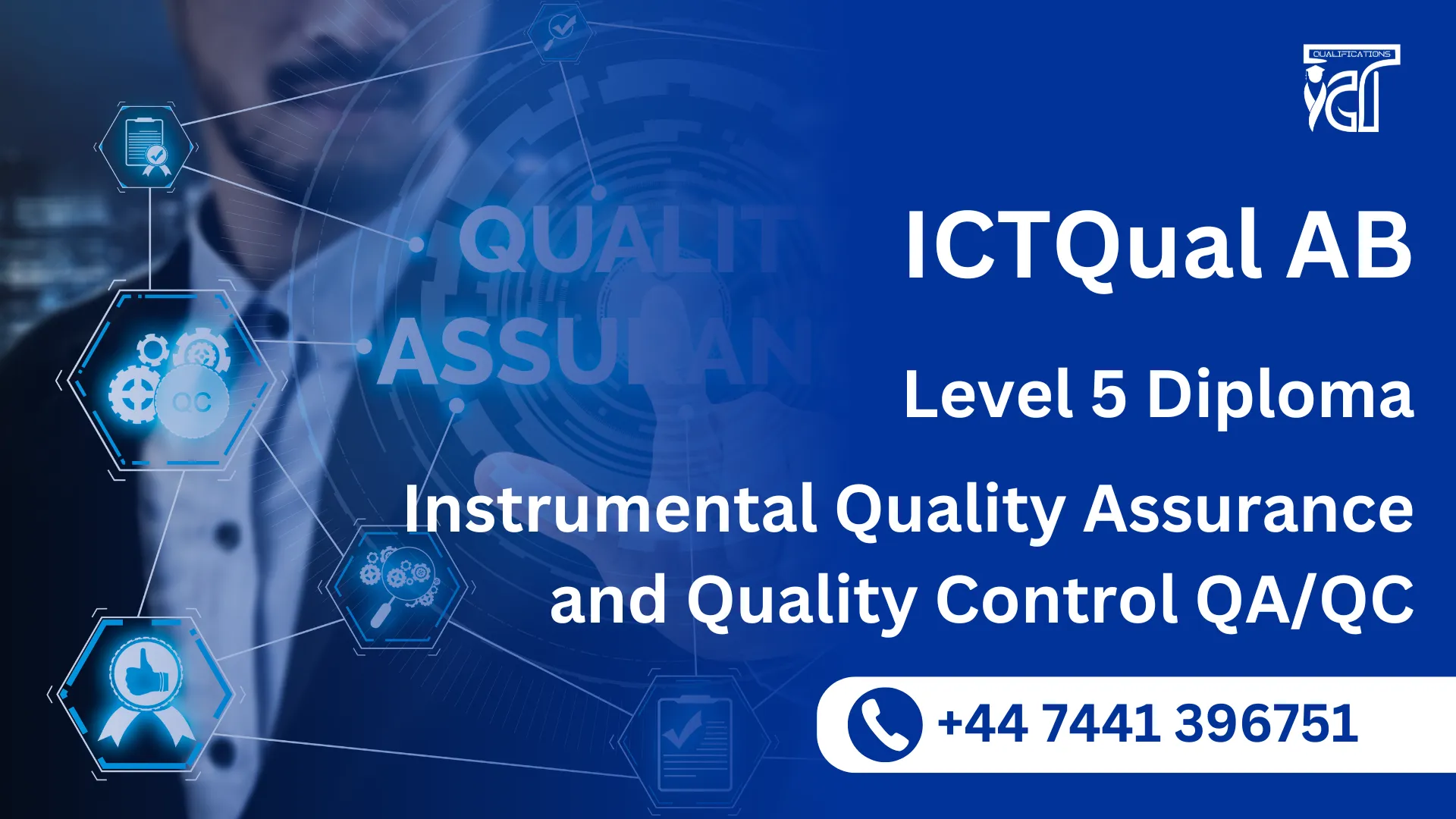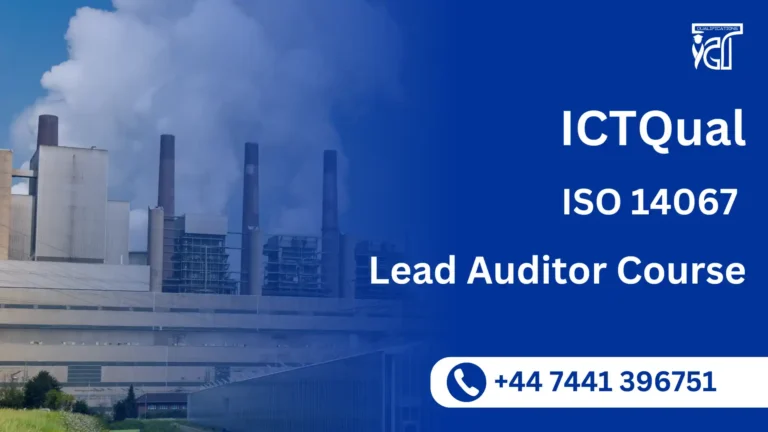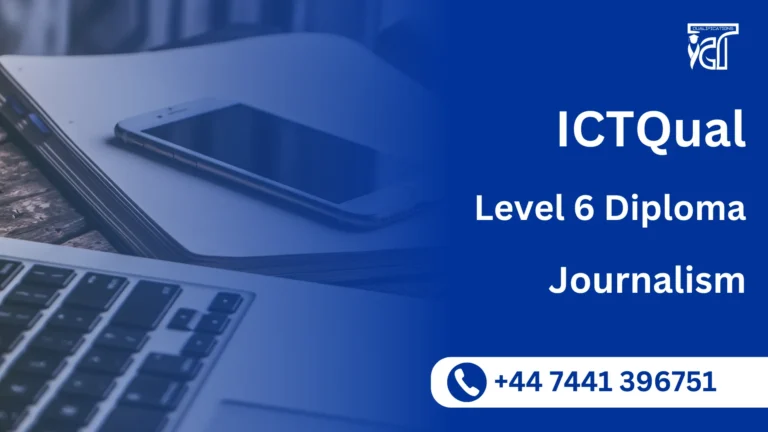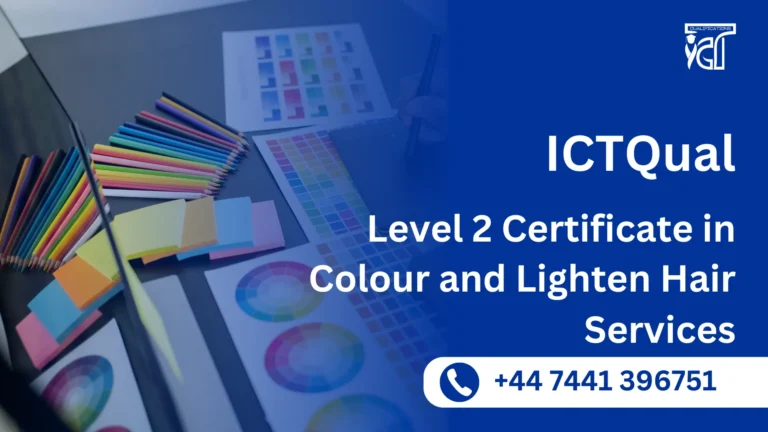The ICTQual AB Level 5 Diploma in Instrumental Quality Assurance and Quality Control (QA/QC) is a career‑focused qualification designed to build essential skills in industrial quality systems. It equips learners with the knowledge and confidence to manage inspection processes, calibration techniques, and compliance frameworks, ensuring reliability and precision across technical environments.
Learners are introduced to the fundamentals of QA/QC practices, including material handling, instrumentation, and documentation aligned with international standards such as ISO, ASTM, API, and IEC. The program blends theoretical learning with practical application, enabling participants to apply quality assurance principles directly within industries such as manufacturing, oil & gas, pharmaceuticals, and engineering.
The diploma emphasizes both technical and managerial development, preparing learners to contribute effectively to QA/QC teams and projects. By focusing on inspection strategies, risk‑based planning, and regulatory compliance, the course ensures participants are capable of supporting organizational quality objectives and continuous improvement initiatives.
Upon completion, learners will be well‑positioned for roles such as QA/QC Technician, Quality Inspector, or Compliance Officer. The qualification also serves as a progression pathway toward advanced diplomas and professional certifications, offering international recognition and career mobility in the field of quality assurance and control.
ICTQual AB Level 5 Diploma in Instrumental Quality Assurance and Quality Control QA/QC
This qualification, the ICTQual AB Level 5 Diploma in Instrumental Quality Assurance and Quality Control QA/QC, consists of 6 mandatory units.
| Sr# | Unit Title |
| 1 | Advanced ITP Development and Multi‑Stage Inspections |
| 2 | Comprehensive Use of Checklists for QA/QC Audits |
| 3 | Advanced Material Preservation and Traceability Systems |
| 4 | Detailed Application of NEC/NEMA Standards in Instrumentation Projects |
| 5 | Instrument Tubing, Junction Boxes, and Cabinets – Inspection and Compliance |
| 6 | Advanced Testing, Loop Checking, and Commissioning of Instrument Systems |
Learning Outcomes for the ICTQual AB Level 5 Diploma in Instrumental Quality Assurance and Quality Control QA/QC:
1. Advanced ITP Development and Multi‑Stage Inspections
- Design complex Inspection Test Plans (ITPs) for multi‑disciplinary instrumentation projects
- Integrate inspection stages across engineering, procurement, and installation phases
- Assign inspection responsibilities and timelines within large project frameworks
- Evaluate inspection outcomes and revise ITPs based on non‑conformance trends
- Apply ITPs to ensure traceability, accountability, and compliance
- Audit ITP implementation across subcontractors and suppliers
- Align ITPs with international standards and client specifications
- Document inspection results for regulatory and contractual reporting
2. Comprehensive Use of Checklists for QA/QC Audits
- Develop detailed QA/QC checklists for instrumentation audits
- Apply checklists to verify compliance with NEC, NEMA, and Aramco standards
- Conduct internal and external audits using structured checklist formats
- Identify systemic issues through checklist analysis and reporting
- Maintain audit records for traceability and certification purposes
- Use checklists to support continuous improvement and risk mitigation
- Train junior staff in checklist‑based inspection procedures
- Integrate checklist data into digital QA/QC management systems
3. Advanced Material Preservation and Traceability Systems
- Implement preservation protocols for sensitive instrumentation components
- Monitor environmental and handling conditions affecting material integrity
- Apply traceability systems to track materials from receipt to installation
- Audit preservation practices across storage, transport, and field use
- Identify and document material degradation or non‑conformance
- Align preservation activities with international QA/QC standards
- Maintain preservation logs and inspection records for compliance audits
- Coordinate with suppliers to ensure preservation specifications are met
4. Detailed Application of NEC/NEMA Standards in Instrumentation Projects
- Interpret NEC and NEMA standards for complex instrumentation installations
- Apply NEC‑250 grounding and NEMA VE‑1/VE‑2 cable tray requirements
- Inspect conduit systems (RMS, FMT, RGS, IMT) under NEC Articles 344–400
- Verify junction box and cabinet installations against NEMA classifications
- Identify and resolve compliance issues during field inspections
- Document findings and corrective actions in accordance with QA/QC protocols
- Ensure installations meet safety, reliability, and regulatory standards
- Communicate standard requirements to project teams and contractors
5. Instrument Tubing, Junction Boxes, and Cabinets – Inspection and Compliance
- Inspect instrument tubing for layout, support, and leak integrity
- Verify junction box and cabinet installations against NEMA and project specs
- Apply QA/QC procedures to tubing bending, routing, and connection practices
- Identify common faults in tubing and enclosure installations
- Document inspection results and recommend corrective actions
- Ensure compliance with Aramco and international instrumentation standards
- Coordinate inspections across multiple trades and disciplines
- Maintain inspection logs for commissioning and handover
6. Advanced Testing, Loop Checking, and Commissioning of Instrument Systems
- Plan and execute loop checks for complex instrumentation systems
- Conduct functional testing of pressure, flow, temperature, and level elements
- Document loop check results and verify against ITPs and standards
- Apply commissioning procedures to ensure system readiness and safety
- Identify and troubleshoot issues during testing and commissioning
- Coordinate with engineering and operations teams during commissioning phases
- Ensure compliance with international QA/QC and safety standards
- Contribute to final handover documentation and system certification
The ICTQual AB Level 5 Diploma in Instrumental Quality Assurance and Quality Control (QA/QC) is designed to provide learners with a strong foundation in quality systems, inspection methods, and compliance frameworks. It equips participants with the technical and practical skills needed to support QA/QC operations across industries, while also preparing them for supervisory responsibilities and future progression into advanced qualifications.
Technical Foundations
- Core QA/QC knowledge: Build a solid understanding of assurance and control principles.
- Instrumental techniques: Learn calibration, inspection, and testing methods.
- Compliance frameworks: Gain familiarity with ISO, ASTM, API, and IEC standards.
- Practical application: Apply theoretical knowledge to real‑world industrial scenarios.
Career Development
- Industry relevance: Skills applicable in manufacturing, oil & gas, pharmaceuticals, and engineering.
- Supervisory readiness: Preparation for roles such as QA/QC Technician, Inspector, or Compliance Officer.
- Progression pathways: Eligibility to advance into Level 6 Diplomas or specialized QA/QC certifications.
- Global recognition: Qualification respected internationally for career mobility.
Professional Skills
- Documentation expertise: Training in reporting, record‑keeping, and compliance documentation.
- Problem‑solving ability: Skills to identify and resolve quality issues effectively.
- Risk awareness: Understanding of risk assessment and corrective action planning.
- Team contribution: Ability to support QA/QC teams and projects efficiently.
Organizational Impact
- Enhanced compliance: Contribute to meeting international quality standards.
- Improved efficiency: Support streamlined processes and reduced errors.
- Continuous improvement: Foster a culture of reliability and innovation.
- Industry competitiveness: Help organizations maintain high standards in global markets.
This diploma is designed for individuals aiming to build a strong foundation in QA/QC practices with a focus on instrumental techniques. It suits learners who are either entering the quality assurance field or professionals already working in technical industries who wish to enhance their expertise and career prospects.
Learners with Technical Backgrounds
- Engineering professionals: Civil, mechanical, electrical, or industrial fields.
- Technicians and inspectors: Already engaged in calibration, testing, or instrumentation.
- Manufacturing staff: Those working in production or fabrication environments.
- Oil & gas workers: Seeking QA/QC expertise for compliance and safety.
- Pharmaceutical and healthcare staff: Operating in regulated industries requiring strict quality standards.
Career‑Focused Participants
- Aspiring QA/QC technicians: Learners aiming to enter specialized quality roles.
- Mid‑career professionals: Seeking promotion into supervisory positions.
- Compliance officers: Ensuring adherence to international standards.
- Project coordinators: Managing QA/QC aspects of industrial projects.
- Audit specialists: Interested in advancing skills in inspection and certification.
Global Learners & Career Changers
- International candidates: Looking for globally recognized qualifications.
- Career changers: Transitioning into QA/QC from related technical fields.
- Continuous learners: Committed to professional development.
- Industry consultants: Advising organizations on quality frameworks.
- Future leaders: Aspiring to management roles in QA/QC.
Organizational & Industry‑Driven Learners
- Corporate employees: Sponsored by organizations to strengthen QA/QC capacity.
- Industrial trainers: Preparing to mentor or train QA/QC teams.
- Risk management specialists: Focused on safety, reliability, and corrective action planning.
- Process improvement experts: Driving efficiency and innovation in operations.
The ICTQual AB Level 5 Diploma in Instrumental QA/QC is a foundation for learners who want to advance their careers in quality assurance and control. It provides the technical and compliance knowledge needed to step into higher‑level qualifications and prepares participants for leadership roles in industries where precision and reliability are critical.
Academic Progression
- Level 6 Diplomas: Eligibility to enroll in advanced QA/QC or technical management programs.
- Specialized QA/QC pathways: Opportunities to pursue diplomas in piping, welding, or instrumentation QA/QC.
- Advanced study options: Access to higher‑level qualifications in engineering management or industrial quality systems.
- International recognition: Pathways to study with global institutions offering advanced technical programs.
Professional Certifications
- ISO auditor training: Certification to conduct audits aligned with ISO standards.
- Industry‑specific credentials: Compliance certifications for oil & gas, pharmaceuticals, or manufacturing.
- Risk management certifications: Training in safety, reliability, and corrective action planning.
- Professional memberships: Access to international engineering and QA/QC associations.
Career Advancement
- QA/QC Technician: Progression into specialized inspection roles.
- Quality Inspector: Supervisory positions ensuring compliance with standards.
- Compliance Officer: Roles focused on regulatory adherence and documentation.
- Project QA/QC Coordinator: Managing quality aspects of industrial projects.
- Consultant roles: Advising organizations on quality frameworks and compliance strategies.
Industry Opportunities
- Manufacturing sector: Senior QA/QC roles in production and fabrication.
- Oil & gas industry: Advanced inspection and compliance positions.
- Pharmaceuticals: Quality leadership in regulated healthcare environments.
- Civil and mechanical engineering: Supervisory roles in construction and infrastructure projects.
Entry Requirements
Learners must meet the following criteria to be considered for admission into the course:
- Age Requirement: Applicants must be at least 20 years old at the time of enrollment.
- Educational Background:Prior completion of a recognized qualification in QA/QC, engineering, or a related technical discipline.
- Work Experience: Experience in QA/QC, inspection, compliance, or engineering projects is preferred. Prior involvement in calibration, testing, or instrumentation strengthens eligibility.
- English Language Proficiency:Ability to read, write, and communicate effectively in English. May be required through IELTS 5.0–5.5, TOEFL, or equivalent certifications for non‑native speakers.
Register Now
Qualification Process
Qualification Process for the ICTQual AB Level 5 Diploma in Instrumental Quality Assurance and Quality Control QA/QC
- Self-Assessment:
Begin by evaluating your eligibility to ensure you meet the qualification requirements, including work experience, knowledge, and language proficiency. - Registration:
Complete your registration by submitting the required documents, including a scanned copy of a valid ID, and paying the registration fee. - Induction:
An assessor will conduct an induction to confirm your eligibility for the course and explain the evidence requirements. If you do not meet the criteria, your registration will be cancelled, and the fee will be refunded. - Assignments & Evidence Submission:
Provide all assignments and the necessary evidence based on the assessment criteria outlined in the course. If you are unsure of the required evidence, consult with the assessor for guidance on the type and nature of evidence needed. - Feedback and Revision:
The assessor will review your submitted evidence and provide feedback. Evidence that meets the criteria will be marked as “Criteria Met,” while any gaps will be identified. You will be asked to revise and resubmit if needed. - Competence Evidence:
Submit final evidence demonstrating that all learning outcomes have been met. This evidence will be marked as “Criteria Met” by the assessor once it is satisfactory. - Internal Quality Assurance (IQA):
The Internal Quality Assurance Verifier (IQA) will review your evidence to ensure consistency, quality, and compliance with standards. - External Verification:
The IQA will submit your portfolio to ICTQUAL AB External Quality Assurance Verifiers (EQA) for final confirmation. The EQA may contact you directly to verify the authenticity of your evidence. - Certification:
Upon successful completion of all checks, ICTQUAL AB will issue your official certificate, confirming that you have attained the ICTQual AB Level 5 Diploma in Instrumental Quality Assurance and Quality Control QA/QC







